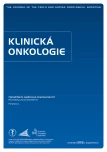-
Medical journals
- Career
Juvenile Polyposis Syndrome
Authors: P. Vasovčák 1; L. Foretová 2; A. Puchmajerová 1; A. Křepelová 1
Authors‘ workplace: Ústav biologie a lékařské genetiky, Fakultní nemocnice v Motole, Praha 1; Oddělení epidemiologie a genetiky nádorů, Masarykův onkologický ústav, Brno 2
Published in: Klin Onkol 2012; 25(Supplementum): 16-17
Overview
Juvenile polyposis syndrome (JPS) is an autosomal dominant disorder characterized by the occurrence of juvenile polyps and predisposition to cancer of the gastrointestinal tract (GIT). Characteristic feature of juvenile polyps are irregular cystic glands filled with mucus not observed in other colorectal cancer syndromes. Germline mutations in the SMAD4 and BMPR1A genes are found in 40% of the JP individuals. Hereditary hemorrhagic telangiectasia (HHT) and higher frequency of gastric polyposis are associated mostly with SMAD4 mutations.
Key words:
juvenile polyp – GIT tumors – hereditary hemorrhagic telangiectasia – SMAD4 – BMPR1A
This study was supported by the project of the research organisation 00064203, by the European Regional Development Fund and by the national budget of the Czech Republic (OP VaVpI – RECaMO, CZ.1.05/2.1.00/03.0101).
The authors declare they have no potential conflicts of interest concerning drugs, products, or services used in the study.
The Editorial board declares that the manuscript met the ICMJE “uniform requirements” for biomedical papersSubmitted:
26. 4. 2012Accepted:
25. 6. 2012
Sources
1. Jass JR, Williams CB, Bussey HJ et al. Juvenile polyposis a precancerous condition. Histopathology 1988; 13(6): 619–630.
2. Chow E, Macrae F. A review of juvenile polyposis syndrome. J Gastroenterol Hepatol 2005; 20(11): 1634–1640.
3. Burt RW, Bishop DT, Lynch HT et al. Risk and surveillance of individuals with heritable factors for colorectal cancer. WHO Collaborating Centre for the Prevention of Colorectal Cancer. Bull World Health Organ 1990; 68(5): 655–665.
4. Sachatello CR, Griffen WO Jr. Hereditary polypoid diseases of the gastrointestinal tract: a working classification. Am J Surg 1975; 129(2): 198–203.
5. Howe JR, Mitros FA, Summers RW. The risk of gastrointestinal carcinoma in familial juvenile polyposis. Ann Surg Oncol 1998; 5(8): 751–756.
6. Jass JR. Juvenile polyposis. In: Spiegelman AD, Thomson JP (eds). Familial adenomatous polyposis and other polyposis syndromes. London: Edward Arnold 1994 : 203–214.
7. Aretz S, Stienen D, Uhlhaas S et al. High proportion of large genomic deletions and a genotype phenotype update in 80 unrelated families with juvenile polyposis syndrome. J Med Genet 2007; 44(11): 702–709.
8. van Hattem WA, Brosens LA, de Leng WW et al. Large genomic deletions of SMAD4, BMPR1A and PTEN in juvenile polyposis. Gut 2008; 57(5): 623–627.
9. Brosens LA, van Hattem WA, Kools MC et al. No TGFBRII germline mutations in juvenile polyposis patients without SMAD4 or BMPR1A mutation. Gut 2009; 58(1): 154–156.
10. Gallione CJ, Richards JA, Letteboer TG et al. SMAD4 mutations found in unselected HHT patients. J Med Genet 2006; 43(10): 793–797.
11. Gallione CJ, Repetto GM, Legius E et al. A combined syndrome of juvenile polyposis and hereditary haemorrhagic telangiectasia associated with mutations in MADH4 (SMAD4). Lancet 2004; 363(9412): 852–859.
12. Oncel M, Church JM, Remzi FH et al. Colonic surgery in patients with juvenile polyposis syndrome: a case series. Dis Colon Rectum 2005; 48(1): 49–55.
13. Scott-Conner CE, Hausmann M, Hall TJ et al. Familial juvenile polyposis: patterns of recurrence and implications for surgical management. J Am Coll Surg 1995; 181(5): 407–413.
Labels
Paediatric clinical oncology Surgery Clinical oncology
Article was published inClinical Oncology

2012 Issue Supplementum-
All articles in this issue
- Juvenile Polyposis Syndrome
- Birt-Hogg-Dubé Syndrome
- Hereditary Pheochromocytoma and Paraganglioma
- Hereditary Leiomyomatosis and Renal Cell Cancer – HLRCC / / Multiple Cutaneous and Uterine Leimomyomatosis – MCUL
- The Clinical Importance of a Genetic Analysis of Moderate-Risk Cancer Susceptibility Genes in Breast and Other Cancer Patients from the Czech Republic
- Genetic Counselling in Male Carriers of BRCA1 and BRCA2 Gene Mutations
- The Effect of Prophylactic Mastectomy with Recontruction on Quality of Life in BRCA Positive Women
- Surgical Prevention of Breast Carcinoma in Patients with Hereditary Risk
- Preimplantation Genetic Diagnosis (PGD) of Hereditary Cancer Syndromes
- Evaluation of Variants of Unknown Significance in the BRCA2 gene
- Diagnostics of Breast Cancer in High-Risk Women – Our Own Experience
- Rhabdoid Tumours
- Hereditary Diffuse Gastric Cancer
- Constitutional Mismatch Repair-Deficiency Syndrome (CMMR-D) – a Case Report of a Family with Biallelic MSH6 Mutation
- Clinical Dysmorphic Syndromes with Tumorigenesis
- Li-Fraumeni Syndrome – a Proposal of Complex Prevention Care for Carriers of TP53 Mutation with Total-Body MRI
- Clinical Oncology
- Journal archive
- Current issue
- Online only
- About the journal
Most read in this issue- Birt-Hogg-Dubé Syndrome
- The Clinical Importance of a Genetic Analysis of Moderate-Risk Cancer Susceptibility Genes in Breast and Other Cancer Patients from the Czech Republic
- Hereditary Diffuse Gastric Cancer
- Clinical Dysmorphic Syndromes with Tumorigenesis
Login#ADS_BOTTOM_SCRIPTS#Forgotten passwordEnter the email address that you registered with. We will send you instructions on how to set a new password.
- Career

